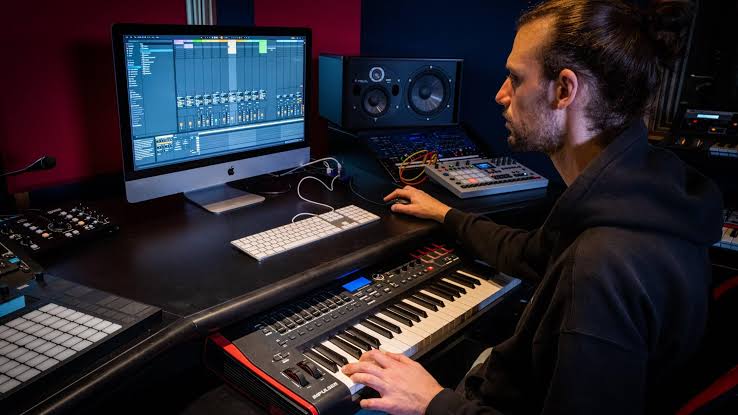An online music production degree can open up a lot of opportunities in the music industry without requiring you to step foot in a traditional classroom.
With an online music production degree, you can gain the knowledge necessary to learn about various media applications and the latest digital music technologies while also understanding the fundamentals of the music business.
Benefits of an Online Music Production Degree
Here are some of the major benefits of earning your music production degree online:
1. You can learn on your own schedule
With online courses, you can log in and participate whenever it fits your own schedule. No commuting or strict class schedules to adhere to. This flexibility allows you to balance your education with work or family commitments.
2. You’ll save money
Online programs are often more affordable than traditional on-campus degrees. You’ll avoid costs like room and board, transportation, and parking fees. Some schools may charge lower tuition for online students.
3. You can study from anywhere
As long as you have an internet connection, you can complete your coursework from anywhere in the world. Whether you want to study from home, a coffee shop, or a different country, you’ll have the flexibility to learn wherever is most convenient for you.
4. You’ll build valuable technical skills
An online music production degree teaches skills that translate across jobs and careers. You’ll become proficient in music production software like Ableton Live, Pro Tools, and Logic Pro. You’ll also build a strong foundation in music theory, songwriting, and audio engineering.
5. An online music production degree provides a flexible, affordable education with valuable career skills
While studying online does require discipline and time management, the benefits can make it an attractive option, especially if you have work or family commitments to juggle.
READ ALSO: Online BBA Programs: Earn Your Degree From Anywhere
What to Look for in an Online Music Production Program
When evaluating online music production programs, several factors are important to consider.
1. Accredited and Up-to-Date Curriculum
Look for a program that is accredited and offers an up-to-date curriculum focused on current tools and technologies, like Ableton Live, Logic Pro, and Pro Tools. Core courses should cover music theory, sound design, recording, editing, mixing, and mastering.
2. Qualified Instructors
Instructors should have experience in the music industry as producers, engineers, composers or performers. They should use professional software and hardware in their own music production.
Student reviews and testimonials about instructor quality and support can help determine how engaged and helpful instructors are.
3. Practical Learning
An online music production program should emphasize practical, hands-on learning. Look for opportunities to gain real-world experience through internships, mentoring, or working with a record label. Some programs may provide equipment and software for at-home use during the program.
4. Career Support
The program should offer career support services like resume review, interview preparation, and job placement assistance.
They should also provide networking opportunities to connect with other music professionals. Some may also offer continuing education and skills training for graduates.
5. Flexibility
Consider your own needs and learning preferences. Look for a program that offers flexibility, like part-time or accelerated options, recorded lectures or interactive live sessions, and 24/7 access to resources.
With many program options available, doing thorough research is key. Finding the right fit will prepare you with the skills and experience to start your career as a music producer.
READ ALSO: online computer information systems degree
Career Paths With an Online Music Production Degree
Here are some of the paths you can pursue:
1. Music Producer
As a music producer, you’ll work directly with recording artists to craft and shape their music. You’ll be involved in selecting songs, hiring musicians, and overseeing the recording process.
Successful producers, like Rick Rubin or Quincy Jones, can have very rewarding careers working with top artists.
2. Recording Engineer
Recording engineers, sometimes called audio engineers, work behind the scenes to capture high-quality recordings of music and audio. You’ll operate mixing boards, microphones, and other equipment to record music, podcasts, audiobooks, and more.
3. Sound Designer
Sound designers create the audio for many types of media, including films, TV shows, video games, podcasts, and commercials. You’ll design and edit original music, sound effects, and ambient noise to set the right mood and tone.
4. Other options
Some other paths include:
- Music Editor: Edits and polishes music for commercials, films, TV, and media.
- Mixing Engineer: Focuses on blending and balancing recorded music and audio tracks.
- Mastering Engineer: Ensures consistent sound quality and volume levels for audio projects before distribution.
- Songwriter: Writes lyrics and melodies for musical artists and commercial music.
An online music production degree provides a solid foundation in audio engineering, music theory, and the latest technologies used in the industry.
With the right skills and experience, you’ll have the opportunity to land an exciting and fulfilling career crafting sound.






